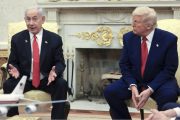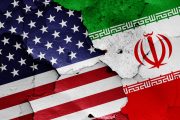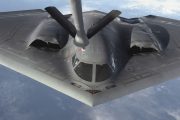
The guided-missile submarine USS Georgia (shown) entered the Persian Gulf on December 21, escorted by the guided-missile cruisers USS Port Royal and USS Philippine Sea, in what is regarded as a deterrence mission against Iran.
The trio of ships entered the Persian Gulf through the Strait of Hormuz, according to a news release from U.S. Naval Forces Central Command. The strait is regarded as the world’s most critical “choke point” for vessels carrying oil and other petroleum products.
“Georgia’s presence in the U.S. 5th Fleet area of operations (AOO) demonstrates the U.S. Navy’s ability to sail and operate wherever international law allows,” the release stated.
“As an inherently flexible maneuver force, capable of supporting routine and contingency operations, Georgia’s presence demonstrates the United States’ commitment to regional partners and maritime security with a full spectrum of capabilities to remain ready to defend against any threat at any time,” added the release. The statement noted that U.S. guided-missile submarines can “carry up to 154 Tomahawk land-attack cruise missiles” and “can also be configured to host up to 66 Special Operations Forces.”
The movement of U.S. ships into the waterway south of Iran came one day after eight rockets were fired into Baghdad’s International Zone near the U.S. Embassy in Iraq. The rockets caused “minor damage,” but no embassy personnel were injured. The Iraqi military said one Iraqi soldier was injured when a rocket landed near a security checkpoint.
“The United States strongly condemns the latest attack by Iran-backed militias on the International Zone in Baghdad,” Secretary of State Mike Pompeo said in a December 20 statement. “We wish those hurt a speedy recovery.”
In a tweet from Iran’s Foreign Ministry, Saeed Khatibzadeh, Iran denied responsibility for the attack.
“We strongly refute @SecPompeo’s irresponsible anti-#Iran accusations, which blatantly aim to create tension,” Khatibzadeh tweeted. “Iran rejects any attack on diplomatic missions. The U.S. military presence is the source of instability in our region. No amount of spin can divert blame for its evils.”
Although some observers have made a connection between that event and the decision to send U.S. ships into the Persian Gulf, a Navy official told Fox News that these warship movements into the gulf were “long planned” and were not in response to the embassy attack.
However, the timing of the mission may have been influenced by the upcoming anniversary on January 3 of the Iranian major general Qasem Soleimani., commander of the Quds Force, one of five branches of Iran’s Islamic Revolutionary Guard Corps (IRGC).
U.S. officials justified the strike on Soleimani, claiming it was necessary to stop an “imminent attack.” Some U.S. officials expressed concern that Iran may use the anniversary of Solemani’s killing to carry out a strike on U.S. interests.
Tensions between Iran and nations relying on the ability to safely ship LNG (liquefied natural gas) and oil through the Strait of Hormuz have been heightened in recent years, especially after attacks on two oil tankers (one Taiwanese and the other Japanese) moving through the strait in June 2019.
Then-National Security Advisor John Bolton blamed Iran for both attacks, claiming that the rogue country was “almost certainly” responsible for those attacks. Bolton asked rhetorically “Who else would you think is doing it?”
Former Representative Ron Paul (R-Texas), who was a leading non-interventionist during his time in Congress, complained of the desire for foreign intervention among many U.S. policymakers, “The U.S. foreign policy establishment has for decades been dominated by neoconservative interventionists and falsely-named ‘humanitarian’ interventionists. These people believe that because the United States is the one ‘exceptional nation,’ no conflict anywhere in the world could possibly be solved without our butting our noses into it.”
Paul continued, “U.S. policy toward Iran is an unwise consistency and the Trump administration is hopelessly floundering on the bad advice of the neocons. They want nothing more than war on Iran. But the American people do not. It’s time to end this failed policy of confrontation with Iran.”
While there is nothing necessarily provocative about U.S. ships navigating the neutral waters of the Persian Gulf, care must be taken to be sure that such missions are not part of a larger agenda to draw Iran into military conflict.
Related articles:
U.K. Joins United States in Strait of Hormuz Maritime Security Mission
Reacting to U.S. Sanctions, Iran Boasts of Ability to Control Persian Gulf
Amid Trump’s War of Words With Iran, Neocons Seek Regime Change
Are Attacks on Oil Tankers at Hormuz Strait a Prelude to War?
U.K. Foreign Secretary Calls For “Protection Mission” to Guard Ships in Persian Gulf
Britain and Iran Confront Each Other in Persian Gulf
Are Attacks on Oil Tankers at Hormuz Strait a Prelude to War?
Amid Threat of Physical War, Iran and Trump Engage in War of Words
Administration Hawks Led by John Bolton Create Anti-Iran Military Plan
Iranian Military Leader Says U.S. Deployment of Carrier Group Makes It “a Target”




